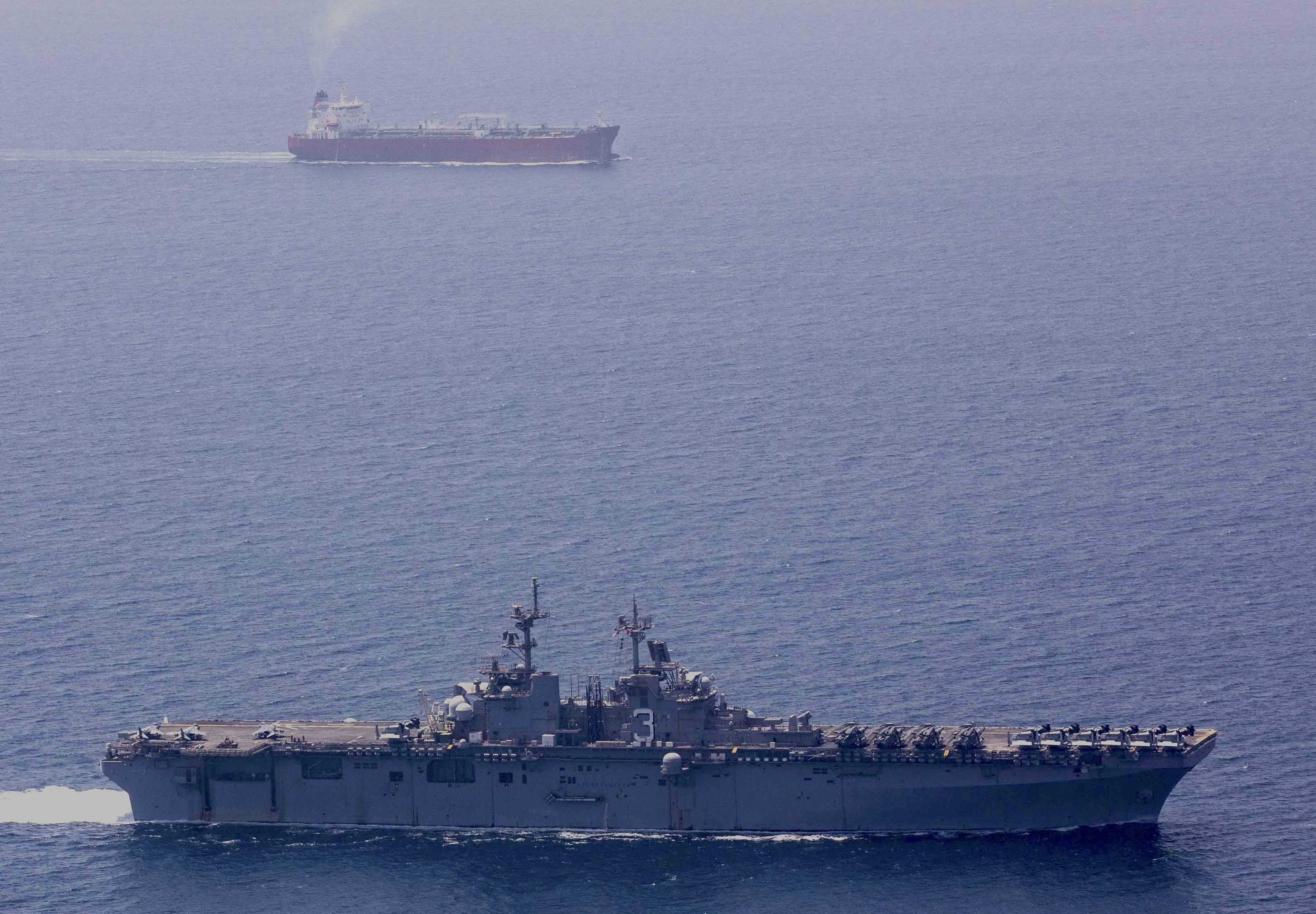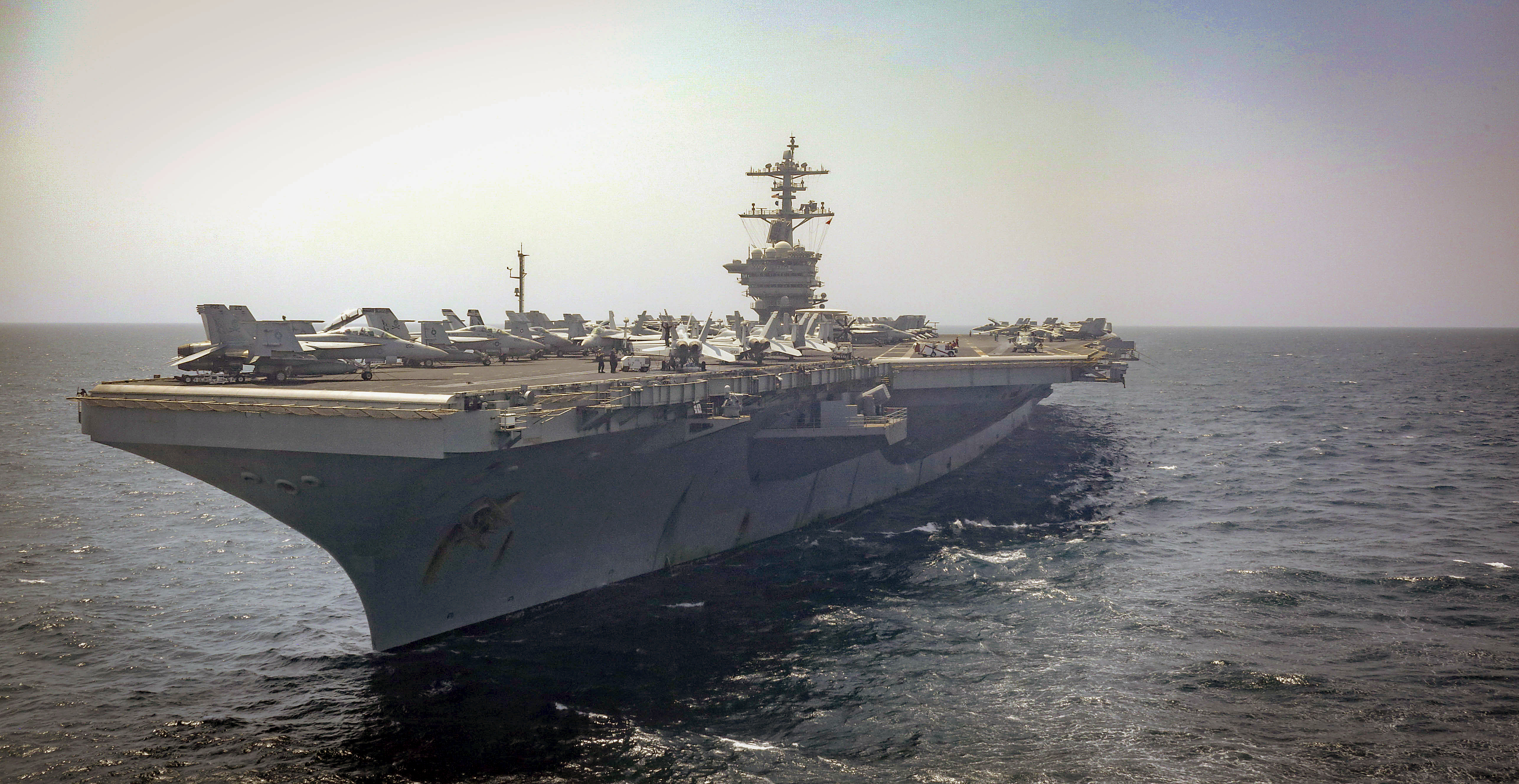
The Navy pays a steep price keeping an aircraft carrier with escorts on station to deter attacks on oil tanker traffic operating in and around the Persian Gulf as part of the United States’ “maximum pressure” campaign against Iran, according to a new report. The ongoing carrier operations in the region are not only pricey for the U.S. Navy but also creates the potential to disrupt energy markets if a confrontation escalates.
Operation Sentinel, the U.S.-led effort to maintain maritime security through the strait, involves deploying more aircraft to the region and sending more U.S. troops to support air defense systems sent to Persian Gulf states at the expense of other parts of the world, says the Center for New American Security report, ‘In Dire Straits’ Implications of U.S.-Iran Tensions for the Global Oil Market.
Marine Gen. Kenneth McKenzie, the head of U.S. Central Command, now has resources to protect shipping traffic transiting the Strait of Hormuz, but by doing so, “cuts a lot of what you can do in the Pacific and Europe,” Ilan Goldenberg one of the report’s authors told USNI News in an interview.
Goldenberg, a former Pentagon official specializing in Iran, said the diversion of forces is part of the hidden costs of missions that require long-term American naval, air and ground assets. Something has to give somewhere else, he said.
“The biggest impact is in the Navy,” affecting its ships, aircraft and missiles and overall readiness, he said.
The worry is, for example, if the U.S. started escorting tankers through the strait at the same rate it did during the Iran-Iraq war in the 1980s with the smaller fleet of today, other combatant commanders would be short-changed for assets, Goldenberg said.
“The Navy is not big enough for this type of mission,” said Kayleigh Thomas, a research associate at CNAS and report co-author.
Thomas explained there could be four warships involved, plus intelligence, surveillance and reconnaissance assets in play to ensure safe transit through Hormuz. These “deterrence by denial” measures also can lead to a slippery slope of military escalation — possibly through a miscalculation or mistake.
The other danger, according to Goldenberg, is starting an escort mission could become similar to counter-terrorism missions that can constantly keep expanding to meet new threats.

Although a host of nations in Europe and Asia are largely dependent on the unimpeded transit of oil tankers from the Middle East to their shores, there has been a reluctance of many allies to join the Americans in this effort to keep the route to the Persian Gulf open. The operations are also happening as the U.S. has become less reliant on Middle East oil than it had been in the past.
Cooperation among allies in “freedom of navigation operations used to be straightforward,” Goldenberg said. Now, “France and Germany are not with us on this.” The United Kingdom, Australia and Bahrain are only providing, “sentry ships.”
President Trump’s decision to pull the U.S. out of the Iran nuclear accord is why France and Germany remain on the sidelines when it comes to ensuring safe maritime operations in the Persian Gulf, Goldenberg said.
Instead of the nuclear deal, the Trump administration started the “maximum pressure” campaign, which involves Operation Sentinel and placing economic sanctions on Iranian individuals, businesses and trading partners. Iran’s continued support of terrorist organizations, like Hezbollah in Lebanon, and meddling in other nation’s affairs by stirring up sectarian divides between Sunnis and Shias across the Middle East, is cited as a reason for the campaign.
So far, though, Iran’s neighbors have demurred when considering military responses to Iran’s actions.
“The Gulf States didn’t want us to retaliate” when the Iranians downed a U.S. Navy RQ-4 unmanned maritime surveillance aircraft, Goldenberg said.
The Gulf States and Saudi Arabia realize Iran is a larger military power than they are. The Sunni states remain dependent on the United States for security, Goldenberg said. He mentioned the accuracy of the attack on Saudi oil facilities as being a wake-up call to the region and the U.S. as to how exposed to Iran’s military reach.
“Iran has not crossed the ‘red line'” of directly attacking American service members since the U.S. withdrew from the nuclear pact. Iran has restricted its moves to tankers, employing limpet mines attached to ships’ sides and underwater drones as warnings of its capability to act militarily. “They are targeting very specifically.”
As for other Pacific allies than Australia, “Japan expressed its support” for keeping the route to the Persian Gulf open, but it lacks the naval capability to back that up, Thomas, the co-author, said. The South Koreans also don’t have the naval capability or willingness to stray far from the peninsula.
What China will do in the region “is the million-dollar question” when it comes to future operations in the Persian Gulf. “China only now is building out the capability” to sustain long-term escort operations that’s bolstered by Beijing’s new naval base in Djibouti, Goldenberg said.
The follow-on question is whether the United States wants China to play a larger role in Middle Eastern affairs or a more global role ensuring shipping lanes remain open?
Some still believe “if there was a crisis [cutting oil petroleum shipments], the United States will respond” in the Straits of Hormuz. “The market has not had doubts yet” nor have regional partners despite differences with the United States, Goldberg said.
“Should the world be counting on us or should there be others [involved] like China,” Goldenberg said. This could be a tempting thought to an administration that is pushing for allies and partners to meet U.S. “burden-sharing” costs for security and a president interested in protecting overseas oil assets.





